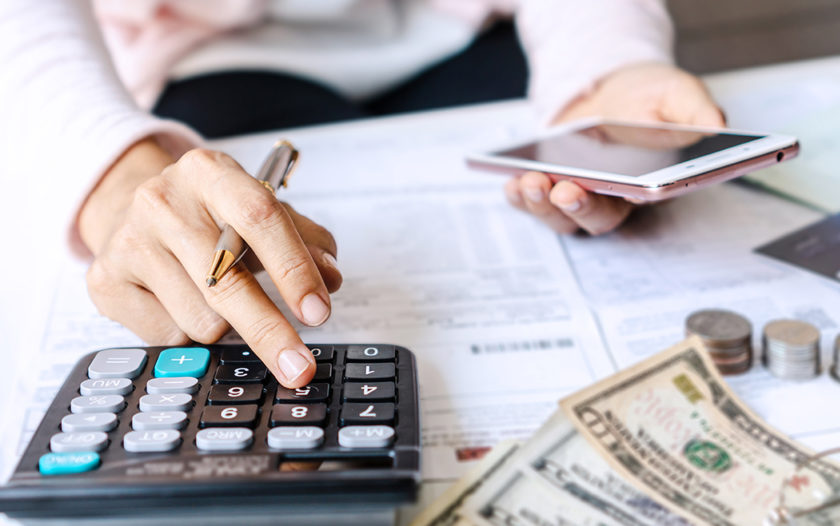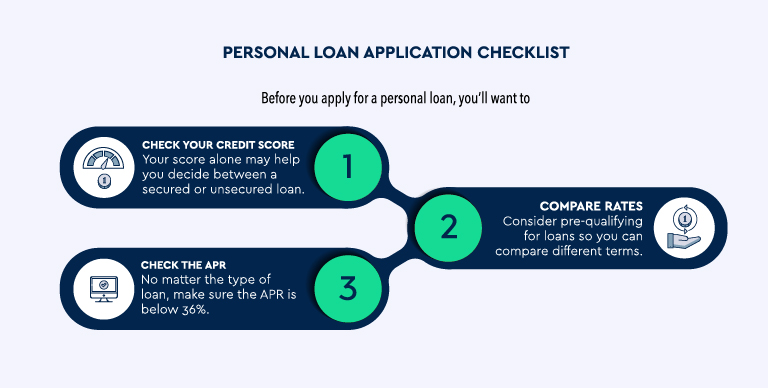Secured vs. Unsecured Personal Loans: What You Need to Know
About Stefanie
Stefanie began her career as a journalist, reporting on options, futures, and pension funds, and most recently worked as a writer and SEO content strategist at a digital marketing agency. In her free time, she enjoys teaching Pilates and spending time with her daughter and Siberian Husky.
Read full bio
At a Glance
Taking out a personal loan can be necessary for many reasons, such as taking out a mortgage or financing student loans. But first, it’s important to know the differences between secured and unsecured personal loans. While the primary difference is that secured loans require collateral and unsecured loans do not, interest rates, loan amounts, loan terms and eligibility criteria can also vary significantly between the two. We’ll go deeper into each below, and explore their benefits and disadvantages:
What is a secured loan?
Secured personal loans use property, such as a savings account, car, or certificate of deposit, as collateral. Secured personal loans are less common than unsecured loans, and are most often used by borrowers with poor credit who don’t qualify for unsecured loans.
Related: What Are Collateral Loans?
How do secured loans work?
As part of the application process, you’ll be asked to supply information about the collateral you’ll use to back the loan. If you fail to repay the loan, the lender will seize that asset.
Secured personal loans are typically easier to qualify for than unsecured loans because supplying collateral lowers the lender’s risk in letting you borrow from them. They also often have lower interest rates because the value of your collateral can affect the rate.
You can get a secured loan from a bank, credit union, or online lender. Once you get the funds, you’ll repay the loan in fixed, monthly installments over the loan’s term.
Secured loan examples
Examples of secured loans include:
1. Personal loan: Often used for consolidating debt, paying off medical bills, funding a large event or purchase, or other purposes. Collateral is typically a savings or investment account or car title.
Learn more: What is a Personal Loan?
2. Auto loans: Used to purchase a new or new-to-you vehicle, and the collateral is the vehicle.
3. Mortgages: Used to purchase a home, and the collateral is your home.
4. Home equity loans: A loan based on the value of your home (equity). Your home is used as collateral.
Learn more: Home Equity Loans
5. Home equity lines of credit (HELOC): A line of credit based on the value of your home (equity) that you can borrow against and repay the funds over time. Your home is used as collateral.
Learn more: Home Equity Line of Credit
Pros and cons of secured loans
Pros
- Easier to obtain
- Better for borrowers with poor or no credit
- High borrowing limits
- Lower interest rates
- Longer repayment terms
Cons
- Risk losing collateral if you default
- May have variable interest rates
- Credit score damage if you miss payment
How to get a secured personal loan?
To obtain a secured personal loan, you can head to a credit union, bank, or online lender that accepts collateral in exchange for a loan. Note that the process for obtaining a secured personal loan isn’t usually that fast, since the lender will need to take the time to assess the value of your collateral.
Find and compare secured personal loans
Check out lenders and solutions that fit your needs
What happens if you default?
If you default on a loan, the secured loan agreement allows the lender to take possession of your collateral without going to court. If the lender can’t sell your collateral for the total amount owed, you’ll be on the hook for the remainder of what’s left.
Learn more: What Happens if You Default on a Personal Loan?
What is an unsecured personal loan?
Unsecured personal loans do not require you to put up any type of property as collateral. Since creditors consider unsecured personal loans riskier than secured loans, higher interest rates are common.
How do unsecured loans work?
Unsecured loan approval depends on factors like your credit score, history, income, and debt-to-income ratio. Because no collateral is required, borrowers don’t risk losing an asset if they default.
Unsecured loans are typically best for borrowers with good to excellent credit (670 or higher), and those borrowers will get the best interest rate. Rates for unsecured loans can range from 4% to 36% depending on how well you qualify, but they are still repaid in fixed, monthly installments. Repayment terms range from 12 to 84 months.
Note that while you won’t lose collateral if you default, your credit score will be significantly affected. You’ll likely then be sent to collections.
You can get a secured loan from a bank, credit union, or online lender, but online lenders often have the best rates and terms.
Unsecured personal loan examples
Examples of unsecured loans include:
1. Personal loan: Often used to renovate a home, pay for a wedding or vacation, medical bills, renovations, car repairs, or other large or emergency expenses.
2. Debt consolidation loan: Used to consolidate and pay off debt such as credit card, medical, or other loan debt.
3. Student loans: Pay for education costs such as tuition and room and board.
4. Personal lines of credit: A financial institution will issue a person a specific number of funds they can draw on in a certain period, similar to a credit card. These flexible loans have interest applied as soon as they are borrowed and can be repaid immediately or later.
Related: Everything you need to know about how a personal line of credit works
5. Credit cards: Borrow money to make purchases up to your credit limit, and pay it off each month.
Pros and cons of unsecured loans
Pros
- Won’t risk losing collateral
- Faster application process
- Fewer restrictions on what funds can be used for
Cons
- Higher interest rates
- More difficult to get approved
- Can hurt credit score
How to get an unsecured personal loan?
Unsecured personal loans are more common than secured loans, and are available at most credit unions, banks, or online lenders. Obtaining an unsecured loan through an online vendor can be quicker since you may be able to pre-qualify.
Find and compare unsecured personal loans
Explore lenders and solutions that fit your needs
What happens if you default?
If you default on an unsecured loan, you can expect your credit score to take a hit. In addition, lenders can place your account into collections as well as seek legal recourse against you to make up for their losses. Collections and legal action can appear on your credit report for years after you’ve defaulted.
Key differences between secured and unsecured loans
| Secured | Unsecured | |
|---|---|---|
| Collateral | Requires collateral such as a car title, house, savings or investment account, or something else of value. Lender can seize the asset should you fail to repay the loan. | No collateral is required, but the loan can be sent to a collections agency if you fail to repay, which can significantly damage your credit score. |
| Interest rates | Typically have lower interest rates since lenders are taking on less risk. | More favorable interest rates for borrowers with credit score of 670 or higher. |
| Borrowing limits | Typically have higher borrowing limits but depend on the lender. | Depends on the lender but may have lower limits. |
| How to use funds | Tend to be approved for specific purposes, like buying a recreational vehicle or boat, house, or car. | More flexibility and fewer restrictions on how you can use the funds can be used for just about anything. |
| Qualifications for approval | Can likely qualify even with bad credit. | Borrowers with poor or no credit may have a more difficult time qualifying. Income and other requirements may also be stricter. |
| Repayment terms | Typically have longer repayment terms due to collateral but vary by lender. | Varies by lender. |
Should you get a secured or unsecured personal loan?
Secured loans are great for borrowers who may not have excellent credit (670 or above) but still need financing for a large purpose or other reason. Secured loans typically have lower interest rates, longer terms, and higher borrowing limits, but they have stricter uses for the funds. Additionally, you must have some type of asset you can offer as collateral and if you fail to repay the loan, you risk losing that asset.
On the other hand, unsecured loans may have slightly higher interest rates, but they are better for borrowers with excellent credit who can get lower rates. With unsecured loans, you don’t provide collateral so you don’t risk losing any assets, but you can still significantly damage your credit if you default on the loan. And they can be used for a much wider variety of reasons.
If you’re looking to build credit or need funding for a certain reason and have collateral you can use, a secure loan may be a good option. However, if you have excellent credit, an unsecured loan can give you more flexibility.
FAQs
You can get a personal loan from a bank, credit union (if you’re a member), or online lender. Typically, online lenders offer the most flexibility with eligibility requirements, lower interest rates, and faster approval and funding times.
Related: Best Place to Get a Personal Loan
To qualify for a personal loan, you’ll likely need to have a certain credit score, income, and debt-to-income ratio. This tells the lender you’re a responsible borrower and are able to afford the monthly payments. You’ll also need to provide proof of identity, income, address, and monthly expenses. Lenders list their loan qualifications on their websites.
Related: Get a Personal Loan in 7 Steps
No. Your credit score is a major factor when the lender decides whether to approve you for an unsecured loan. If you have poor credit, you’re better off applying for a secured loan.
If you default on a personal loan, meaning you’ve gone 60 to 90 days or more without making a payment, the loan will be sent to a collections agency. Not only can this seriously drop your credit score, but the collections agency can hound you for payment. This will also be reported to the credit bureaus and remain on your credit report for seven to 10 years.
Yes, you can improve your credit score with a personal loan by making the monthly payments on time each month. Payment history makes up 35% of your score. It also helps add to your credit mix and types, which make up 10% of your score.
Learn more: How personal loans can improve credit?
A credit card loan is considered an unsecured loan because if you don’t make your credit card payments, you don’t lose any collateral. Instead, you’ll be charged interest on the outstanding balance.










